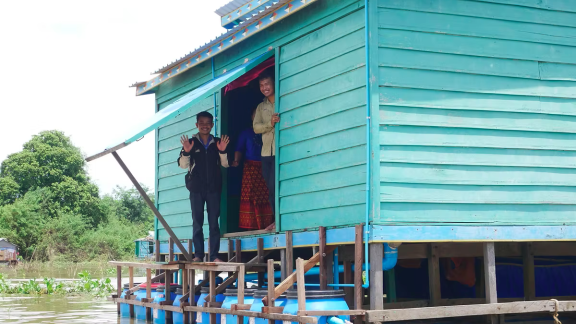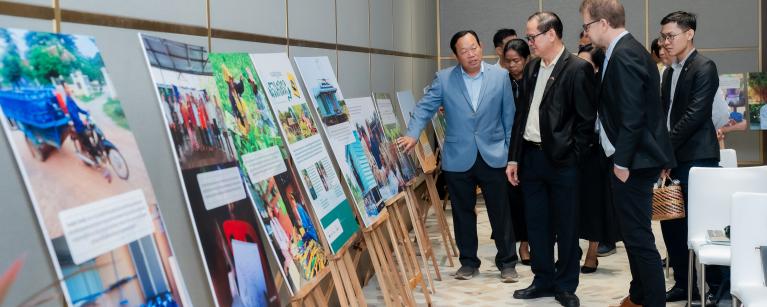Once known only for its abundant fish and floating villages, the Tonle Sap Biosphere Reserve is now becoming a beacon of environmental resilience and community-driven innovation.
After three and a half years of hands-on collaboration, the EU-funded CAPFISH/FOSTER Lot 1 project—“Fisher Folks Making Circular Economy Work for the Western Tonle Sap Lake”—wrapped up with a celebration that marked not just the end of a project, but a bold step toward climate resilience, inclusive growth, and local empowerment.
At a closing ceremony in June attended by over 100 participants, including government ministries, the European Union, civil society organizations, and local communities came together to celebrate the tangible impact and collective accomplishment of the project.
Ms. Sophoan Phean, Oxfam National Director, emphasized the resilience and innovation of Tonle Sap fishing communities. “Through integration of circular economy models with education and sustainable practices, we’ve strengthened livelihoods while protecting our natural resources. She also called for ongoing investment in community-driven solutions that empower communities and preserve the environment,” she said.
Mr. Koen Everaert, Deputy Head of Cooperation at the EU Delegation to Cambodia, added that this project reflects the EU’s commitment to sustainable development. By improving essential services and creating economic opportunities, EU-CAPFISH/FOSTER has laid a strong foundation for more resilient and empowered fishing communities in Cambodia. It also showcases our strong collaboration with the Government as part of our Global Gateway efforts, supporting resilient livelihoods and positioning the country for successful graduation from Least Developed Country (LDC) status.
Through strong partnerships and grassroots action, the project sparked transformative changes across communities surrounding Tonle Sap Lake. Over 2,000 residents and an additional 3,200 students gained access to clean, safe drinking water—an essential step toward better health. Sanitation upgrades reached more than 20,000 students, enhancing hygiene and school environments.
At the same time, the Eco-Brick initiative successfully recycled 4 tons of plastic waste, transforming environmental challenges into income-generating opportunities.
Over 10,000 students benefited from school meals, scholarships, and improved learning spaces, fueling their educational journeys. Meanwhile, new sustainable livelihood opportunities took root, from honey farming and eco-tourism to solar-powered energy access and expanded market links for women-led producer groups—strengthening economic resilience, enhancing entrepreneurial skills development and empowering future growth.
“EU-CAPFISH/FOSTER project is a testament to what can be achieved through strong partnerships and shared vision. The Fisheries Administration is proud to work alongside with the EU and our partners to uplift communities and promote sustainable fisheries management.”
This wasn’t just development—it was transformation, rooted in people’s needs and strengthened by their own leadership.
The EU-CAPFISH/FOSTER Lot1 project was implemented in collaboration with 13 partner organizations, including Aide et Action, Cambodian Agriculture Cooperative Corporation, Cambodian Disabled People’s Organisation, Culture and Environment Preservation Association, Fisheries Action Coalition Team, Kampuchea Action to Promote Education, Okra Solar, Operation Enfants du Cambodge, PAVILION, Sansom Mlup Prey, Teuk Saat 1001, Wetlands Work, and Wildlife Conservation Society.

A total of 164 environmentally friendly floating toilets were installed in floating schools and homes for villagers living in the flooded areas of Tonle Sap Lake. These systems treat waste onsite and capture bacteria, helping to reduce direct pollution in the lake. ©Wetlands Work
